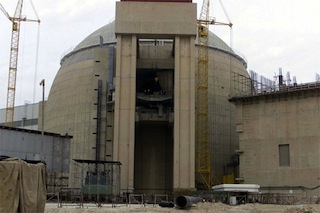Next Steps for Containing Iran's Nuclear Program
March 11, 2011
Featured Image
Today's top nuclear policy stories, with excerpts in bullet form.
Stories we're following today - Friday, March 11, 2011:
The Next Phase of U.S. Strategy on Iran - Joe Cirincione and Rob Leonard [link] forThe Hill's "Congress Blog" [link]
- In an annual Washington rite on Thursday, the head of the U.S. intelligence community will publicly brief the Senate on the major threats facing the nation. Amid carefully worded comments on everything from Libya to terrorism, Director of National Intelligence James Clapper’s most important remarks will focus on Iran’s nuclear program – namely, that diligent U.S. efforts have created both time and opportunity. Policymakers will have to decide how best to use both.
- Expanding on a judgment first expressed in a Bush-era National Intelligence Estimate from 2007, Clapper recently reaffirmed that “Iran’s nuclear decision-making is guided by a cost-benefit approach, which offers the international community opportunities to influence Tehran.”
- In June, the White House pushed through the U.N. Security Council the toughest set of sanctions ever leveled against a state...As a result of its nuclear intransigence, Iran finds itself almost as politically isolated as apartheid-era South Africa. Moreover, it has slowed Iran’s nuclear clock. The sanctions have made it much more difficult for Iran to purchase key materials for the program.
- So we have time. The question now is what to do with it.
Note: Follow the link above to read the author's recommendations
Japan to Evacuate Residents Near Nuke Plant - Mari Yamaguchi for The Associated Press [link]
- Japan ordered thousands of residents near a northeastern nuclear power plant to evacuate on Friday following a massive earthquake that caused a problem in the plant's cooling system. Chief Cabinet Secretary Yukio Edano said the Fukushima No. 1 power plant was not leaking radiation.
- The quake triggered a power outage and when a backup generator also failed, the cooling system was unable to supply water to cool the reactor. The reactor core remains hot even after a shutdown. Japan's nuclear safety agency said the evacuation, ordered by the local government of Fukushima, affects at least 2,800 people. It comes after the government declared a state of emergency at the plant.
- [Endo said] both the state of emergency and evacuation order are meant to be a precaution. It was the first time Japan has declared a state of emergency at a nuclear power plant. "We launched the measure so we can be fully prepared for the worst scenario," he said. "We are using all our might to deal with the situation."
- If the outage in the cooling system persists, eventually radiation could leak out into the environment, and, in the worst case, could cause a reactor meltdown, a nuclear safety agency official said on condition of anonymity, citing sensitivity of the issue.
- The plant is just south of the worst-hit Miyagi prefecture, where a fire broke out at another nuclear plant...It has since been extinguished. Another plant at Onagawa is experiencing a water leak.
Keep Nuclear Terrorist Safeguards - Ken Brill for Politico [link]
- When officials discuss the possibility of a government shutdown, they consistently say the front lines of public safety and national defense will not be affected. However, the stopgap 2011 budget the House proposed undermines our front-line efforts to prevent nuclear terrorism.
- The House budget proposal cuts 22 percent, or more than $600 million, from nonproliferation programs. If passed, these cuts are likely to undermine our nation’s ability to keep nuclear material out of the hands of terrorists.
- I have worked as an ambassador and a senior intelligence official to understand and prevent the threat of nuclear terrorism. The threat is real, and securing nuclear material is the most effective way to combat it.
- The programs targeted by House cuts are the first line of defense against the threat of nuclear terrorism. They are essential and effective. In 2010 alone, NNSA secured 800 bombs’ worth of material.
- While cuts to government spending must be made, drastic cuts to these nuclear material protection programs could damage our national security and undermine our leadership in getting other nations to do more. The proposed cuts would constitute remarkable negligence in the face of a real national security threat.
U.N. Atom Body Board Backs Nuclear Fuel Supply Plan - Fredrik Dahl for Reuters [link]
- Dozens of states, some in the conflict-prone Middle East, are considering launching nuclear power programs to meet growing energy demand and reduce dependence on fossil fuels. But the same technology that is used to make fuel for civilian nuclear reactors can also provide bomb material if refined to a very high degree.
- Member states of the U.N. nuclear watchdog approved Thursday a new fuel supply plan meant to help countries develop atomic energy without increasing the risk of weapons proliferation.
- Several initiatives have been put forward in recent years designed to ensure that their fuel supplies would not be suddenly halted. In the latest such step, a British fuel assurance proposal backed by the United States and Russia won clear support in the 35-nation governing board of the International Atomic Energy Agency (IAEA), with 26 states voting in favor and none against.
- Unlike two projects previously approved by the board, the British proposal does not involve setting up a uranium reserve which states could tap into if their supplies were cut off. Instead, the governments of the supplier and the customer would sign a bilateral agreement, to guarantee that shipments would not be interrupted for non-commercial reasons. The IAEA would throw its weight behind the plan by co-signing the accord, effectively giving the customer state a clean bill of health from a proliferation point of view.



